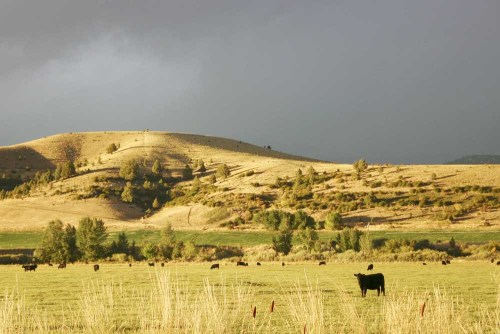Environmentalists seek reversal of Hammonds’ grazing permits
Published 2:00 pm Wednesday, September 25, 2019

- Hammond Ranches was recently re-authorized to use grazing allotments in Eastern Oregon, but an environmental lawsuit seeks to overturn that decision.
BURNS — After winning a court order limiting grazing, environmentalists are now seeking to overturn the federal government’s grazing authorization for two Oregon ranchers convicted but later pardoned for arson.
Dwight and Steven Hammond, a father and son who own a ranch near Diamond, recovered their grazing permits in early 2019 after receiving a full pardon last year from President Donald Trump for setting fire to public rangelands.
Trending
Both were released from prison in July 2018 before completing their full 5-year mandatory minimum sentences, but they were still prohibited from running cattle on four U.S. Bureau of Land Management allotments near their ranch.
Former Interior Secretary Ryan Zinke, who oversaw the BLM, decided to reinstate their grazing permits in January because the pardons “constitute unique and important changed circumstances” that warranted a reversal of the agency’s 2014 denial of their permit renewal request.
Several environmental groups — Western Watersheds Project, Center for Biological Diversity and Wildearth Guardian — filed a lawsuit earlier this year arguing that Zinke’s decision violated federal environmental laws.
In July, U.S. District Judge Michael Simon issued an injunction that reduced how much grass the Hammonds’ cattle can consume and restricting which areas they could graze.
The environmental plaintiffs have now filed a motion for summary judgment, asking the judge to vacate the Hammonds’ grazing permits because their presidential pardons “did not alter the conduct, acts and behavior” that led up to the denial of their grazing permits.
“BLM’s permit nonrenewal decision did not rely upon the Hammonds’ arson convictions alone; it also relied upon conduct underlying the other counts for which the Hammonds did not meet the criminal standard of guilt but could be held civilly liable,” according to the environmentalists.
Trending
The plaintiffs argue that BLM’s reinstatement of the grazing permits violated the Federal Land Policy and Management Act, or FLPMA, which requires “satisfactory record of performance and substantial compliance with federal regulations” that the Hammonds lack.
The agency also violated the National Environmental Policy Act, or NEPA, by granting a “categorical exclusion” — known as a CX — that exempted the permit renewals from an environmental assessment or a more thorough environmental impact statement, according to the plaintiffs.
“The agency’s unsupported conclusion that there are no potentially significant impacts to ecologically significant areas cannot justify use of the CX,” the motion said.
The BLM should have analyzed the effects of renewed grazing on the greater sage grouse, rangeland health standards, invasive weeds and fire problems, the groups argue.
“Vacatur of an unlawful NEPA decision is vital because it forces the agency to make a new decision, after a public comment process, properly informed by full disclosure of the environmental baseline and effects of the proposed action,” the motion said.
Capital Press was unable to reach Dwight or Steven Hammond, or the attorney representing the federal government in the lawsuit.
In 2012, a federal jury convicted both the ranchers for igniting a 2001 fire that burned about 140 acres, while Steven Hammond was also found guilty of setting a 2006 fire that spread onto an acre of federal property.
The federal judge overseeing the case determined that the mandatory minimum 5-year sentences for arson would be “grossly disproportionate to the severity of the offenses here” and ordered Steven Hammond to spend one year behind bars, while his father was sentenced to three months.
After the Hammonds had completed their prison terms, however, the 9th U.S. Circuit Court of Appeals ruled they should have been sentenced to the full 5-year minimum terms.
When the ranchers reported back to prison in January 2016, protests against the decision culminated in the occupation and standoff at the Malheur National Wildlife Refuge that attracted nationwide attention.









